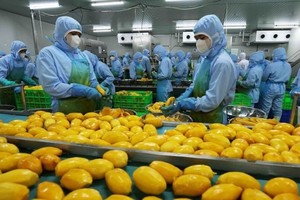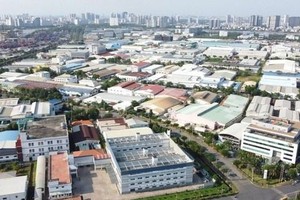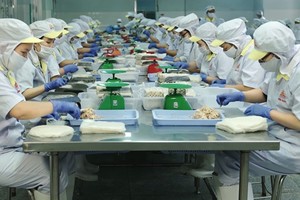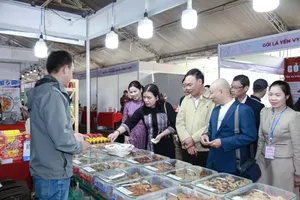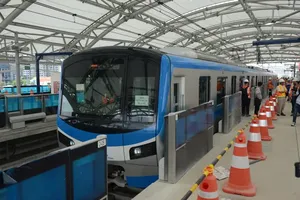At a workshop on May 9 organized by the Ho Chi Minh City Investment and Trade Promotion Center (ITPC), enterprises expressed concern about the risk of the US imposing reciprocal tariffs. Key industries such as wood, seafood, and textiles face the risk of losing market share without timely solutions.
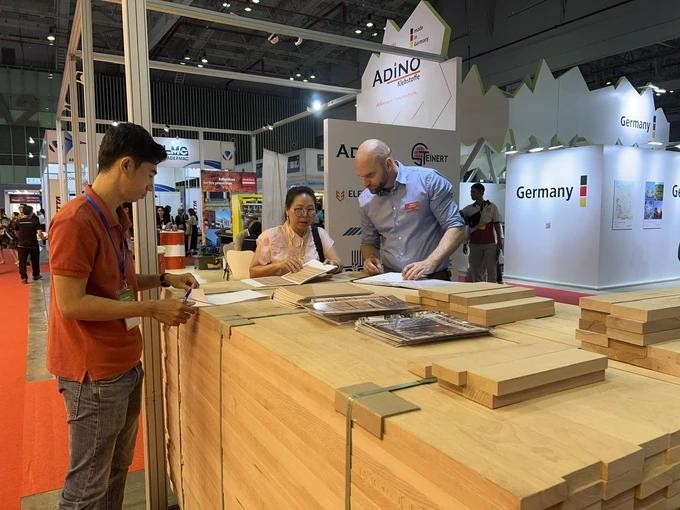
Businesses see decline in orders
Deputy General Secretary Nguyen Hoai Nam of the Vietnam Association of Seafood Exporters and Producers (VASEP) commented that among the 10 countries exporting seafood to the US, Vietnam is facing the highest expected tax rate of 46 percent. This situation significantly increases cost pressures, potentially making businesses hard to fulfill goods orders.
He mentioned that businesses are capitalizing on the 'golden period' prior to the July 9 deadline to increase exports while the tax rate is still at 10 percent. Nevertheless, the uncertainty and insufficient information from US Customs are hindering many organizations from formulating long-term strategies.
General Director Tran Viet Anh of Nam Thai Son Import-Export Joint Stock Company noted that many businesses are experiencing a decline in orders during the first quarter of 2025, particularly in key sectors such as garments, seafood, and wooden furniture. Several U.S. partners have proactively canceled contracts or postponed deliveries, while also requesting that Vietnamese exporters share potential tax burdens should new policies take effect.
Director Tran Viet Anh revealed that his company received price adjustment requests from several major U.S. clients; he added some partners have even suggested relocating orders to Mexico or Indonesia, where tax incentives are more favorable. This situation leaves Vietnamese businesses in a highly passive position.
The decrease in orders has led to a reduction in factory capacity, labor cuts, and increased inventories. If policy negotiations fail to yield favorable outcomes, numerous businesses are contemplating a strategic shift in their market focus.
The scenario grows increasingly complex as US importers impose stricter requirements on documentation, traceability, labor standards, and environmental considerations. Dr. Son Tran from SUNY Cobleskill University (USA) cautioned that businesses failing to promptly finalize legal documentation and standardize their processes for documentation and traceability risk not only losing orders but also jeopardizing their long-term viability in the US market.
Businesses are swiftly capturing their hold on larger portions of the market
In such context, experts emphasize that Vietnamese businesses should not remain passive while awaiting negotiation outcomes, but instead develop proactive response strategies. Deputy Director Cao Thi Phi Van of the Investment and Trade Promotion Center (ITPC) outlined several key strategies such as establishing a transparent origin-tracing system, standardizing documentation procedures, restructuring market approaches, and preparing the legal groundwork for exports to the U.S. These measures are essential for sustaining access to this critical market.
Dr. Son Tran added that global trade is shifting from a model of absolute liberalization to one of strategic trade while increasingly shaped by industrial policy and national security concerns. To stay competitive, Vietnamese enterprises must accelerate the modernization of their supply chains, ensuring compliance with U.S. standards from the outset. Beyond contract manufacturing, businesses should also focus on building their own brands to reduce reliance on major importers.
In addition, another notable proposal is to negotiate bilaterally to reduce the tax rate to 18 percent-25 percent. According to lecturer Vu Minh Khuong of the National University of Singapore, reducing tax rates while expanding the import of US goods such as pharmaceuticals, medical equipment, and consumer goods will help create a balance in negotiations and reduce bilateral tensions.
Some representatives of logistics companies in the US also noted that Vietnamese enterprises should improve the classification of Harmonized System (HS) codes, storage of documents, trademark registration, and certification of conformity. Some businesses that have not prepared a suitable legal system may be caught up in lengthy investigations, severely affecting export activities and financial liquidity. Rather than simply waiting for the outcomes of negotiations, businesses must proactively prepare legal documentation, upgrade their supply chains, diversify markets, and seize the remaining 'golden time' to strengthen their market position—crucial actions for maintaining competitiveness.


